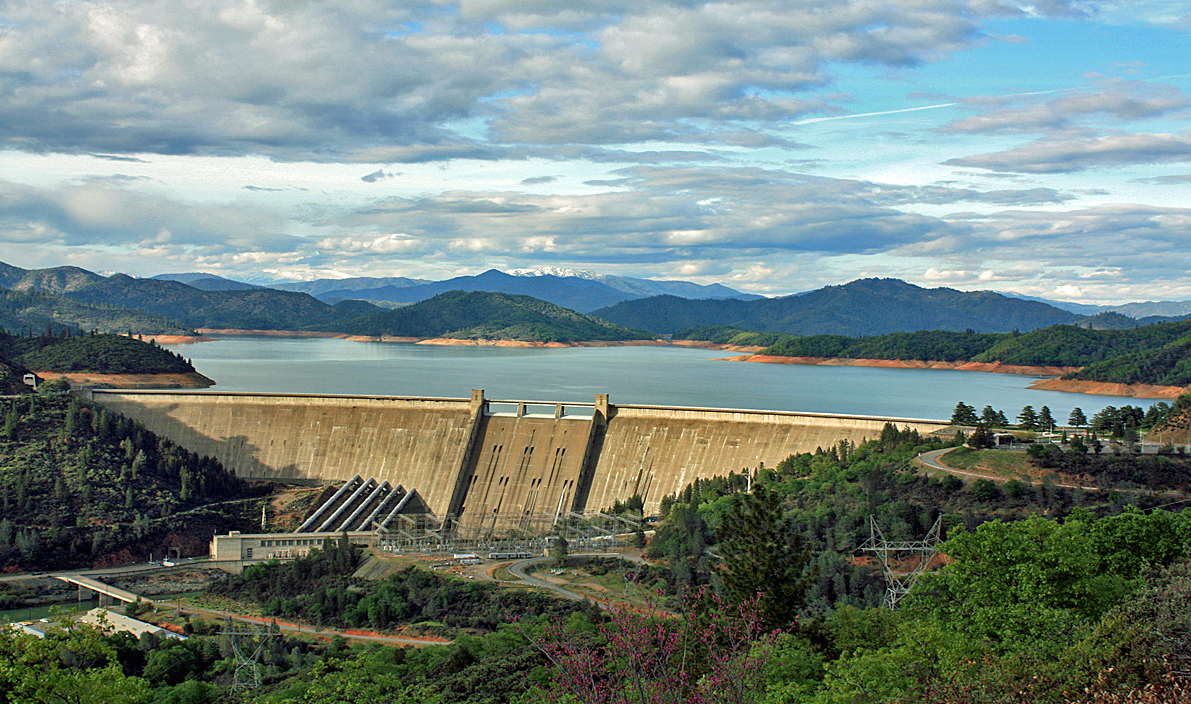A ‘Dam’ Controversial Issue At Shasta

When I was in high school. my dad and I took a road trip from the Bay Area up into Oregon. We went the California coast via Highway 101, cut across at Crescent City and crossed the border into Cave Junction, spent our second night in Medford, took a day trip to spectacular Crater Lake and then made better time going home by getting back to I-5. I remember stopping at the vista point and snapping some photos – I sure don’t know if I have them around anymore – overlooking three Shastas -Dam, Lake, Mountain, similar to the shot above via Wikimedia. It’s a great view.
Years later I better understood the importance Shasta Lake and its Dam has on the state’s water supply. Now as California has endured another devastating drought and what appears to be a dangerous situation forthe state’s Chinook salmon population. Now Shasta Dam is at the forefront of a proposed reconstruction.
The Sacramento Bee has a report on the dam and the role the McCloud River, which is formed on the eastern side of Shasta Lake.
A higher structure also would inundate parts of the McCloud, altering its current state.
“This is unquestionably a beautiful stretch of river,” said Westlands general manager Tom Birgmingham, as he walked along its banks last month. “The river deserves to be protected in its current form, but that’s going to have to give a little bit to raise the dam.”
Opponents of the dam project, however, are refusing to give at all. They include the state of California, a local Native American tribe and environmental and fishing groups.
They say raising the dam by 18.5 feet, under the current federal proposal, would submerge sacred sites of the Winnemem Wintu Tribe and ruin a stretch of a river prized by recreational trout anglers. They say it also would be a violation of the 1972 Wild and Scenic Rivers act, which prohibits the state from supporting projects that alter certain natural waterways.
Disagreement over raising Shasta Dam has been going on for decades. The Obama administration essentially tabled the issue over questions about who would foot the bill.
Now the $1.3 billion project has returned with force. Congress in March appropriated $20 million for pre-construction planning. The appropriation, part of a massive federal budget bill signed into law by President Donald Trump, was enough to touch off a political fracas stretching from Washington to Sacramento.
Gov. Jerry Brown’s natural resources secretary, John Laird, sent a letter to congressional leaders saying raising Shasta Dam would be flat-out illegal under California’s Wild and Scenic Rivers Act. The law protects the McCloud against projects that would harm its “free-flowing condition,” Laird argued.
Westlands Water Dist GM Tom Birmingham said the McCloud was "going to have to give a little bit to raise the (Shasta) dam." We believe the McCloud has given enough, native #casalmon and steelhead have given enough. https://t.co/zlnXgP7YUt @ryansabalow #cawater
— California Trout (@CalTrout) May 7, 2018
Here’s a little bit more from the Bee about the fishing ramifications:
Others have strong connections to the banks of the McCloud as well. For more than a century, much of the land along the river belonged to the Hills family of San Francisco, which owned the Hills Bros. coffee empire. The family turned the property into a private fly-fishing enclave known as the Bollibokka Club. Each year, wealthy sportsmen from the Bay Area and beyond come to the remote spot northeast of Redding where the Hills family had built a handful of rustic cabins.
In 2006, Birmingham, from the Westlands Water District, happened to vist the Bollibokka Club as a guest of his brother-in-law when a fishing guide began lamenting that the good times on the river were in danger of ending: A Bay Area developer was preparing to buy the land and build a bloc of posh vacation homes.
The federal Bureau of Reclamation had been kicking around the idea of raising Shasta Dam since 1980. Birmingham, seeing an opportunity, persuaded Westlands buy the property – the last seven miles of McCloud River canyon and the fishing club – in a deal worth $35 million.
Westlands took control of the Bollibokka, a club so exclusive that renting one of its cabins costs $7,300 a week and only 10 fishermen are allowed to wet their lines at a time. Westlands contracts with The Fly Shop in Redding to run the fishing operations. Maintaining Bollibokka is a loss for Westlands, but that’s besides the point, Brimingham said.
“Our concern was if this was the location of multi-million dollar vacation home sites, it would be more difficult to raise the dam,” he said.



